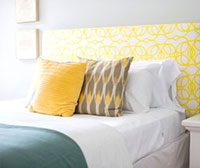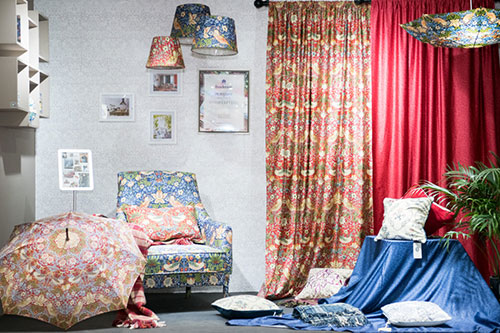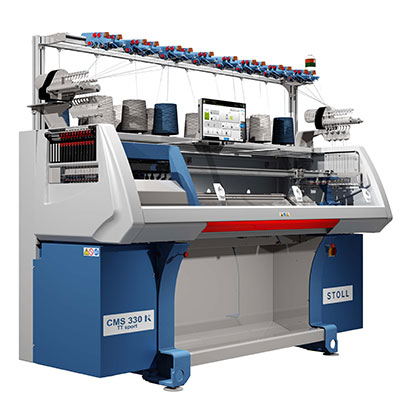FW
"For decades the home textiles business focused on launching a wide range of products. These included everything from bed sheets and comforters to towels. But recently, the industry has started to curtail its product excess as it is finally discovering that less is often more. This was particularly evident at this year’s New York Home Fashions Market held in September 2019. The twice-yearly trade show, held in closed showrooms along Manhattan’s lower Fifth Avenue, recorded a bulk business worth $25 billion in home textiles market."
 For decades the home textiles business focused on launching a wide range of products. These included everything from bed sheets and comforters to towels. But recently, the industry has started to curtail its product excess as it is finally discovering that less is often more. This was particularly evident at this year’s New York Home Fashions Market held in September 2019. The twice-yearly trade show, held in closed showrooms along Manhattan’s lower Fifth Avenue, recorded a bulk business worth $25 billion in home textiles market.
For decades the home textiles business focused on launching a wide range of products. These included everything from bed sheets and comforters to towels. But recently, the industry has started to curtail its product excess as it is finally discovering that less is often more. This was particularly evident at this year’s New York Home Fashions Market held in September 2019. The twice-yearly trade show, held in closed showrooms along Manhattan’s lower Fifth Avenue, recorded a bulk business worth $25 billion in home textiles market.
Over the past few seasons, this sector has been working to launch new products with attributes like sustainability, transparency and naturally sourced materials. The New York Fashion market show reflected these new sensibilities in core bed and bath products.
Shifting to a more sustainable model
Bed and bath products have always earned a bad reputation for their abundant use of natural resources. However, now the fashion industry plans to move to a more sustainable model by emphasising on recycled products and individual components. Since around 90 per cent of home textile products come from the Asian production powerhouses of China, India and Pakistan, understanding their manufacturing chain is often a challenge for vendors. These vendors are now able to trace the raw materials in their products back to their growing fields by using DNA marking, RFID tagging and other new technologies.
However, now the fashion industry plans to move to a more sustainable model by emphasising on recycled products and individual components. Since around 90 per cent of home textile products come from the Asian production powerhouses of China, India and Pakistan, understanding their manufacturing chain is often a challenge for vendors. These vendors are now able to trace the raw materials in their products back to their growing fields by using DNA marking, RFID tagging and other new technologies.
Certification gains importance
Home textiles have always been viewed as free-for-all products as there are no real regulatory or safety standards governing these products. Now, international third-party organisations like Oeko-Tex and Global Organic Textiles Standard (GOTS) are rising in prominence at the urging of retailers who want to offer a point of differentiation for their products.
The spectrum of raw materials has increased dramatically over the years, with the introduction of tree-derived cellulose, linen, bamboo and other natural fibers. Though Cotton still maintains its majority market share, several new differentiators like Supima, Egyptian and Better Cotton Initiative (BCI) also exist n the market.
Products with CBD extracts
Several companies also introduced bedding products containing CBD extracts either applied topically to the fabric or infused into the fibers. These companies implied that these CBD products are good for the well-being of their consumers.
All attention paid by companies to technology, innovation and product performance was in stark contrast to earlier editions which purely focused on fashion. The only real exception to the less-is-more dictum was in the form of the weighted blanket showcased by countless companies at the event.
Milan-inspired brand, Miraggio recently launched an exclusive women’s handbag collection, to freshen up the current fashion trends.
The collection offers four distinctive ranges under the labels of Rebel Chic, Bold & Beast, Rose Coco, and Minimalisque. Each of these ranges characterise a different personality to give every category its own USP.
Rebel Chic portrays designs which can be elaborated as edgy, embellished, and glitzy, while Bold and Beast delegates the strong, wild and dauntless spirit of a woman. Rose Coco on the other hand celebrates femininity and its expression in the chicest embodiment, while Minimalisque is the representation of a basic, simple yet sophisticated attitude, featuring solid shades, geometric contours, detailed and playful designs.
These premium yet affordable handbags showcase high standards of craftsmanship. They boast of enthralling designs, aesthetic motifs, and radical cuts.
Wrangler, a part of Kontoor Brands, Inc, has introduced new denim dyed with foam, an innovative technique that uses 100 per cent less water than conventionally-dyed denim.
The Indigood foam-dyed denim represents Wrangler’s continued commitment to using its global scale to advance the denim industry while maintaining the authenticity, quality and style that consumers expect from it.
Indigood foam-dye entirely replaces the traditional water drums and chemical baths of traditional indigo dyeing, reducing by 100 per cent the amount of water required to turn denim into shade of indigo blue. The new dyeing process also reduces energy use and waste by more than 60 per cent compared to the traditional denim dyeing process.
The Indigood products will be featured in the Icons Collection, giving consumers access to Wrangler’s most iconic products with the highest level of sustainability available on the denim market today. In addition, with absolutely no compromise to quality, the Indigood products include recycled cotton, laser and ozone finishing. The collection includes both male and female jeans, shirts and jackets in dark and light shades.
The launch of Indigood demonstrates Wrangler’s continued commitment to sustainability, reflected in the brand’s global sustainability goals, which include: conserving 5.5 billion litres of water at owned and operated facilities by 2020; using 100 per cent preferred chemistry throughout its supply chain by 2020; powering all owned and operated facilities with 100 per cent renewable electricity by 2025; and sourcing 100 per cent sustainable cotton by 2025.
Multi-brand e-commerce fashion retailer Nykaa Fashion has launched a private label “Rsvp” online as an affordable collection of women’s party wear.
The line features floor-length evening dresses as well as more smart-casual sets and cocktail dresses. The label caters to a millennial demographic and prices range from Rs 3,995 ($56) for a set to around Rs 5,995 for a sequinned gown. Nykaa Fashion’s new private label joins its online brand selection which includes House of Masaba, Ritu Kumar, and Global Desi.
Nykaa Fashion is the apparel arm of Nykaa, which launched as a multi-brand beauty e-commerce site in 2012. Nykaa the beauty store was founded by entrepreneur Falguni Nayar and her daughter Adwaita Nayar runs the clothing segment of the business. Nykaa has expanded offline across India with its Nykaa Luxe and On Trend beauty stores but for now Nykaa Fashion is online only.
Lenzing plans to drastically reduce its CO2 footprint and become entirely carbon neutral by 2050.
By 2030 the chemical group’s aim is to reduce its CO2 emissions per tonne of product by almost 50 per cent both inside its operational boundaries and in its supply chain. The group will cut its emissions, for instance, by adapting new technologies in current production processes and in new production plants. It will improve energy efficiency and increase the share of renewable energy sources. One current project to achieve this is the transformation from coal to bioenergy at its production site in China.
Lenzing’s decarbonisation targets make it a frontrunner, not only in the world of fiber producers but also among major industrial companies. Lenzing will use blockchain technology to support its Tencel branded fiber business. This will ensure complete transparency and traceability for brands and consumers of its fibers in the finished garment. The supply chain transparency from wood to garment and home textiles will enable all customers and partners to identify Tencel fibers and the respective wood source in each production and distribution step. Thanks to a QR code on the final garment, consumers will be able to detect the origin of the clothes they intend to buy.
Under the proposed Preferential Trade Agreement (PTA), the Bangladesh government will finalise a list of 300 products for seeking duty-free market access to Indonesia.
The Ministry of Commerce (MoC) has completed consultations with the stakeholders and received recommendations from the Export Promotion Bureau (EPB) of Bangladesh.
After finalising the list, the MoC will send it to Indonesia through the Ministry of Foreign Affairs, seeking approval by the Indonesian government.
Jute and jute goods, leather and leather goods, pharmaceuticals and garment items are some of the products named in the list.
The two countries are working on signing this PTA to boost bilateral trade and promote trade and economic partnership between the two countries. The bilateral trade between Bangladesh and Indonesia is expected to increase by fivefolds to around $10 billion in next 10 years, according to the sector insiders.
Increasing consumer awareness about the negative impact of the clothing and textile industry on the environment is one of the reasons volumes have started to decline.
Consumers have been buying clothes in ever-increasing quantities over the past 20 years as fast-fashion retailers such as H&M and Zara and budget retailers including Primark and Walmart cut prices after shifting production to Asia. So apparel markets in many developed countries may now be entering a lengthy period of structural decline.
Earnings forecasts for the world’s largest clothing retailers – led by Asos, Zalando, Macys and Marks & Spencer – have been downgraded by almost 40 per cent since the beginning of 2016. If clothing volumes are plateauing in developed countries, the only way the apparel markets there can grow is if clothing prices go up. But these are likely to fall as production continues to shift from China to lower-cost countries in the region such as Vietnam and Bangladesh. US clothing prices have fallen by 0.8 per cent a year since 2001, while UK prices fell for 13 consecutive years until 2010.
Flickstree Asian Designer Week (FADW) was held in Delhi NCR, October 4 to 6, 2019.
The event combined fashion with business. It provided a comprehensive platform for creativity and business in the world of fashion as it hosted more than 40 designers who presented their collections on the ramp. Five buyers as panelists discussed the opportunities in the retail/export business. The discussion opened up avenues of exports for Indian designers who have been hitherto limited to their clientele. The panel had social media influencers who debated about the pressure of communication through the social media and the role it plays in today's fashion business. Influencers were also part of the ramp show that followed the panel discussion.
Fashion start-ups that had come up with pitches for angel investors included 6 Degree (a fashion tech start-up), The Knotty Tales (a tech enabled wedding platform), DROR (a women’s safety app), and Eunimart (a cross border trading enabling platform for medium and small enterprises). They made impressive presentations for their business and sought a second round of funding from the 100-odd investors present in the audience.
Apart from the runway shows, FADW provided a B2B exhibition space for designers to showcase their work and engage with potential buyers.
The exports of crust leather from Bangladesh experienced a negative growth rate of 25.46 per cent during the July–September period of fiscal year 2019-20 as compared to the fiscal year of 2018–19.
According to the Export Promotion Bureau (EPB), the sector registered a negative growth rate of 5.06 per cent, resulting in earnings of US$ 254.39 million during the July-September period of FY 2019–20. This figure was US$ 267.94 million during the same period of the FY 2018–19. Most of the tanneries that have been shifted to the Savar Tannery Complex from Hazaribagh have not fully functional yet which is one of the prime reasons behind the negative growth.
The renowned leather producers of Bangladesh are moving towards artificial and non-leather products to address the global demand as leather prices went up in the world market since 2013. Bangladesh generally exports leather products to countries such as South Korea, China, and the European Union, among others. But they have started using artificial leather products, which are more affordable and lead them to import fewer products from Bangladesh.
Around 155 factories have been shifted to Savar. Of these, 125 factories are running and 25 tanneries have fully started their operations but are processing only crust leather. This sector is not getting the advantage of the Central Effluent Treatment Plant (CETP) and is struggling hard to achieve global standards in terms of compliance. Only leather footwear registered a negative growth rate of 9.28 per cent, resulting in earnings of US$ 159.23 million.
 H. Stoll AG & Co. KG will participate in Futuremoda exhibition for leather and footwear industries that will be held in Spain from October 16-19, 2019. The company will exhibit two CMS 330 TT sport BW machines in gauge E7.2 in Hall A
H. Stoll AG & Co. KG will participate in Futuremoda exhibition for leather and footwear industries that will be held in Spain from October 16-19, 2019. The company will exhibit two CMS 330 TT sport BW machines in gauge E7.2 in Hall A
In 2018, the Futuremoda exhibition served 288 trade fair exhibitors as a forum to introduce their company, their products and services. Its key exhibit areas included footwear and leather goods, shoe machinery and technology, skins and leather, design and pattern, synthetics, supplies, chemicals and premade products.
Stoll AG & Co. KG, with headquarters in Reutlingen is one of the world’s leading manufacturers of flat knitting machines. The long‐established company was founded in 1873 and has 1,000 employees around the world. The brand’s portfolio includes flat knitting machines and pattern software that are used to produce fashion and technical textiles. It exports its products to more than 50 countries worldwide.
With a network of subsidiaries, sales and service centers and numerous agencies, Stoll offers a fully integrated service package. With innovative developments and state‐of‐the‐art production, it makes a multitude of knitting trends possible.












